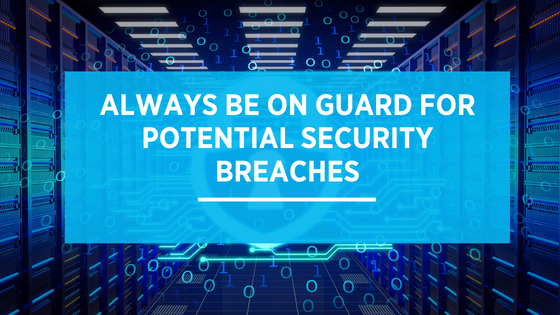Always Be on Guard For Potential Security Breaches

Part of running a successful accounting firm is guarding against potential security breaches. The nature of a financial services business puts you in control of sensitive client information, including taxpayer identification numbers, social security numbers, and other nonpublic personal information.
Your accounting firm must understand the types of security breaches out there to guard against potential attacks. This post outlines the types of security breaches and cyber-attacks you should know, as well as easy ways to guard against them.
What Is a Security Breach?
In general, a security breach is an event in which confidential or sensitive information is exposed to unauthorized individuals. Cybercriminals are determined to steal this data to sell for a profit or may use the data as leverage to blackmail your business for large sums of money.
The breach can happen from within your organization or as part of an external threat.
Security breaches happen every day to businesses large and small across the country. In fact, a recent report found nearly 45% of all companies in the US experienced a data security breach in the past year.
Given this astonishing figure, it’s clear why the FTC has worked diligently to produce the Safeguards Rule for financial institutions like accounting firms. In the Safeguards Rule, the FTC defines a security breach as an event that exposes or potentially exposes the nonpublic personal information of your taxpayer clients when handled or maintained by you or one of your third-party affiliates.
A data security breach causes long-lasting financial and reputation damage for you and your clients. Therefore, it’s important for you to understand the types of security breaches you may encounter and how to be on guard for any potential security breaches in your accounting firm.
Types of Security Breaches & How to Guard Against Them
There are different types of security breaches you should be aware of to guard against potential attacks. As we mentioned above, a security breach can happen in one of two ways: from within your organization or as part of an external security threat.
External Targeted Threats
External cyber attacks are the most widely-known type of potential security breach. In this type of cyber attack, an external hacker or group of cyber criminals targets your accounting firm through specific threats to gain access to your systems or information.
Here are the most common potential external security breaches you should guard against:
Phishing Scam
Phishing attacks are a well-used type of cyber attack with the intention of a more profound security breach. In this type of security breach attack, the attacker will impersonate a trustworthy company or vendor and will include links or attachments with the intent to gain access to your system. These malicious links and attachments act as malware and can quickly overtake your system to gain access to the nonpublic personal information of your clients.
To guard against these malware attacks, ensure your accounting team follows the following guidance:
- Learn how to spot common phishing techniques
- Install anti-phishing email software
Malware Attack
Malware refers to malicious software viruses that can block your system from detecting viruses and spyware. Because phishing is a type of malware, you may already know how a hacker can use malware against your accounting firm.
To guard your business against potential security breaches and malware attacks, ensure that your accounting team follows the following guidance:
- Install business-grade anti-virus or anti-spam software
- Never click on suspicious links
- Never open suspicious attachments
Password Breach
Password breaches are a common way for hackers to access information across different platforms and systems your accounting firm uses. Once a hacker gets ahold of one of your passwords, they can use various techniques to access your entire network.
While there are different methods that a hacker may use to obtain passwords, there is only one way to guard yourself against potential security breaches. Encourage your entire team to use a different strong alphanumeric password for each of their accounts, and routinely update those passwords.
Denial-of-Service (DoS) Attack
Denial-of-service attacks, or DoS attacks, are one of the most malicious security breaches your accounting firm must guard against. Through DoS attacks, an external cybercriminal or group targets and overwhelms your systems or networks with malicious traffic.
Because your network and systems cannot handle the flood of requests, they shut down, leaving you vulnerable to further attacks.
To guard against DoS attacks:
- Learn to see red flags associated with malicious traffic
- Establish internal protocols to deal with these attacks
Internal Security Threats
While there are several more external threats we could have outlined, you must recognize the potential security breaches within your own organization. To guard against internal security breaches, your accounting firm must have solid processes and protocols.
Leaked Information
While it’s hard to believe that someone within your accounting firm could be leaking nonpublic client information, the truth is malicious insiders can be present in any company.
These insiders leverage their access to sensitive taxpayer information or other business information to gain a profit. Leaking sensitive client information, taxpayer identification numbers, and confidential business financial information can cause lasting damage.
To guard against this type of security break, it’s critical to:
- thoroughly vet your employees
- ensure you secure client information on a strictly need-to-know basis
Theft & Loss
Your accounting firm should be prepared to guard against security breaches in the case of loss or theft of company equipment. Most businesses provide laptops and mobile devices to their employees for work mobility purposes. While this is a great opportunity for employees, it does leave your business vulnerable to more theft or loss of said equipment.
You can guard against security breaches in the case of loss or theft by:
- ensuring all employees have access to and use equipment locks
- Your accounting firm relies on a robust password management system
- Install encryption software
The best way to guard against potential security breaches is to set up basic security measures. We recently outlined how your accounting firm can set up security measures here.
Additionally, hiring a professional IT management solutions company, like ABL Computers, ensures your accounting firm is always on guard against potential security breaches. Contact us today to get a customized package tailored to your unique business, and start feeling protected 24/7.

